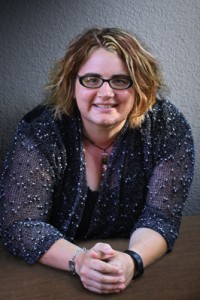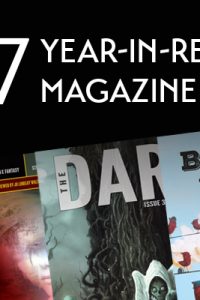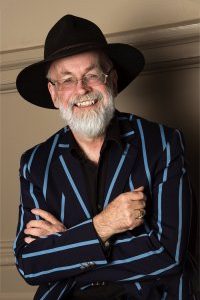The Fire in the Dark: Roundtable with Ted Chiang, Kelly Link, and Usman T. Malik
Locus recently hosted a virtual roundable discussion with leading SF/F writers Ted Chiang, Kelly Link, and Usman T. Malik, who sat down for a wide-ranging and lively conversation about the art, craft, and business of short fiction, and the impact of the form on their creative work and lives. Excerpt from the roundtable follows.
TED CHIANG is the author of collections Stories of Your Life and Others and Exhalation (2019), and novella The Lifecycle of Software Objects. He is the winner of four Hugo Awards, three Nebula Awards, the Theodore Sturgeon Memorial Award, and six Locus Awards, and was inducted into the Science Fiction Hall of Fame in 2020. His novella “Story of Your Life” was adapted into film Arrival (2016). He also writes about technology, including recent essays about the rise of AI programs for the New Yorker. In 2023, Time magazine named him one of the 100 most influential people in AI.
KELLY LINK is the author of the collections Stranger Things Happen, Magic for Beginners, Pretty Monsters, and Get in Trouble. Her short stories have been published in F&SF, The Best American Short Stories, and Prize Stories: The O. Henry Awards. She is a 2018 MacArthur Fellow and has received a grant from the National Endowment for the Arts. She and Gavin J. Grant have co-edited a number of anthologies, including multiple volumes of The Year’s Best Fantasy and Horror and, for young adults, Steampunk! and Monstrous Affections. She is the cofounder of Small Beer Press, co-edits the occasional zine Lady Churchill’s Rosebud Wristlet, and co-owns Book Moon Books. Debut novel The Book of Love is forthcoming in 2024. She lives with her husband and daughter in Northampton MA.
USMAN T. MALIK is a Pakistani American writer and physician. His work has appeared in the Best American Science Fiction & Fantasy series. He has won the Bram Stoker, British Fantasy, and World Fantasy Awards, and has been nominated for Nebula Awards. His debut collection is Midnight Doorways: Fables from Pakistan. He is also a cofounder of the Salam Award for Imaginative Fiction, which seeks to nurture science fiction writers of Pakistani origin.
INFLUENCES AND ORIGINS
Kelly Link: “For me, there wasn’t a turning point short story that made me love the form – it was more a deluge of short stories. Libraries had anthologies of science fiction and fantasy, Golden Age and New Wave collections, single author collections, M.R. James, Joan Aiken, John Collier, Ray Bradbury. I just always really liked short stories. I like novels, too, but I was drawn to short stories. The turning point was realizing that I was not just a reader, but that I could also write short fiction, which I didn’t really consider until I took a workshop on a whim in college, wrote a short story, and thought, ‘Well, I guess I can continue to do this.’ Good enough for me.”
Usman Malik: “I grew up actually reading in Urdu first, and I came to English later. In Urdu, I started with epics and children’s books/novels. There were the writers A. Hameed, Mazhar Kaleem, and Maqbool Jahangir; the magazines Bachon ki Duniya, Bachon ka Bagh, etc. Later came Enid Blyton, whose books routinely made their way from England to Pakistan. I was in love with her work. It just blew me away completely.
“I think I discovered grown-up short fiction maybe in grade five or so. At that time, I was switching my reading from Urdu to English. I didn’t know that I liked horror until I was almost 14. I read it, but I didn’t know that I was particularly attracted to it until a friend of mine came home and saw my shelves, and said, ‘What’s with all these vampires and werewolves?’ And I said, ‘Oh, you’re right. I do read a lot of them, don’t I?’ That’s how I went – a lot of horror classics. I love Stephen King and M.R. James. I discovered Ray Bradbury through Stephen King, and that’s how I started drifting towards science fiction and fantasy. I came from a totally different background, but, once I discovered it, I started reading more and more. I fell in love with Gothic fiction. You know those 1970s anthologies, things like The Big Book of Supernatural Short Stories? Those kind of things – I just loved them, and couldn’t get enough of them. Often, it wasn’t just one story or one author. M.R. James, certainly, was a huge influence. Discovering him was like opening a locked door – a whole haunted world. I still think he’s underrated as a short fiction writer.
“I started writing around grade seven. I think of my life in terms of grades and classes. I can’t think of how old I was, but grade seven or grade eight is when I started writing, and there was this one week where I wrote a story a day, and they were all macabre, Edgar Allan Poe-ish, bleeding-out-the-side kind of stories. They were all probably just junk, but I enjoyed writing them.”
Ted Chiang: “I first became a science fiction reader when I was about 11, when I was in the sixth grade. I pretty quickly wanted to try writing science fiction. I started trying to write an adventure novel in outer space with a couple of classmates of mine. We didn’t get very far, and my classmates did not really pursue it very long, but I continued to try and write stories. The authors that I was reading were, of course, Isaac Asimov and Arthur C. Clarke. Anthologies like The Hugo Winners Vol. 1 & Vol. 2. And also, Asimov’s collections, like The Best of Isaac Asimov, or I, Robot. A lot of those stories had a formative effect on me.
“Aside from that very first attempt at starting a novel, I very quickly switched to trying to write short stories instead of novels. I don’t remember, exactly, what a lot of those stories were, but certainly within a couple years, I was writing with the intention of submitting to magazines. I was 15 when I first submitted a story to a magazine. Short stories seemed more manageable, at the time – they seemed like something you could actually finish, and it seemed like there was a clearer path to submitting them. I had the submission addresses for magazines, so I knew where I could actually mail them. Reading Asimov’s accounts of his early attempts to write stories and submit to magazines was probably influential on what I was trying to do. I don’t mean literally, because my recollection is that he actually walked his manuscript down to the offices of Astounding – back in 1940 he didn’t know any better. Pretty early on I learned that you drop the manuscript in the mail with a self-addressed, stamped envelope to get the manuscript back. Those things were imprinted on me pretty early.”
KL: “It was enormously helpful that in science fiction – and sometimes fantasy – collections that there were forewords and afterwords and introductions to the stories. I was a subscriber to the science fiction Book of the Month club, and I got a lot of stuff that way, some of which I did not enjoy, but most of which I really did. I remember the introductions in a Harlan Ellison collection, or editors’ introductions in various anthologies. That, I think, is the thing that you were talking about, Ted: somebody describing the act of writing, and the things they were thinking about when they wrote the story. That was super educational.”
TC: “Also, they always had front matter which listed the original publications of all the stories, which doesn’t seem to be as common outside of the genre. I think in contemporary literary fiction, a lot of short story collections might have a few sentences about where this work previously appeared, but sometimes they don’t. It seemed like science fiction has a norm of being quite explicit about that: ‘This previously appeared in such and such magazine.”’
UM: “Piggybacking on that, one thing is important for me to describe is that the act of story submission from Pakistan was virtually impossible until the 2000s, when the internet became more widely available. So, while I was writing short fiction at 11 or 12, I didn’t know how to even begin to submit. I remember deciding at a young age that I wanted to be a writer, then quickly forgetting about it, because there was no path forward at all.
“Initially, a lot of us start to write completely unselfconsciously. You’re reading and you’re sort of reproducing what you read – recalibrating, almost, and then reproducing. When I first started writing, I was reading very interesting things, and I wanted to write interesting things that appealed to me. That’s how I started off. But it wasn’t until medical school that I discovered the wonders of the internet.
“In med school I wrote and submitted a bit, but it wasn’t until several years after I became a medicine attending, around 2012 or so, that I finally resumed writing. I had never even heard of Clarion until that year. That’s when I sat down with the intention to become a published writer – someone who actually did it and was not just dreaming about it all the time.
“I think in the Ray Bradbury memoir, Zen in the Art of Writing, there’s this moment where he says the first time he wrote a complete short story, he wrote it in 90 minutes, and then he broke down and he cried, because he knew he had finally written something that was real and true and original.
“In 2013 I was rereading T.S. Eliot’s The Love Song of J. Alfred Prufrock, as we all do, and this idea occurred to me, and I wrote a story in about an hour and a half. The moment that story was done, I knew that it was a real story. I sent it in to Daily Science Fiction because I wanted the money – and they paid 10 cents per word or something like that – and they published it. That was my eureka moment: Oh, this is real! This is a real, true, original story. And I wrote it.”
FOR MORE FROM OUR FOCUS ON SHORT FICTION ISSUE…
Interview design by Francesca Myman.
Read the full interview in the November 2023 issue of Locus.
 While you are here, please take a moment to support Locus with a one-time or recurring donation. We rely on reader donations to keep the magazine and site going, and would like to keep the site paywall free, but WE NEED YOUR FINANCIAL SUPPORT to continue quality coverage of the science fiction and fantasy field.
While you are here, please take a moment to support Locus with a one-time or recurring donation. We rely on reader donations to keep the magazine and site going, and would like to keep the site paywall free, but WE NEED YOUR FINANCIAL SUPPORT to continue quality coverage of the science fiction and fantasy field.
©Locus Magazine. Copyrighted material may not be republished without permission of LSFF.









